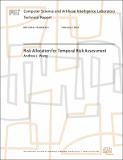Risk Allocation for Temporal Risk Assessment
Author(s)
Wang, Andrew J.
DownloadMIT-CSAIL-TR-2018-011.pdf (616.6Kb)
Other Contributors
Model-based Embedded and Robotic Systems
Advisor
Brian Williams
Terms of use
Metadata
Show full item recordAbstract
Temporal uncertainty arises when performing any activity in the natural world. When activities are composed into temporal plans, then, there is a risk of not meeting the plan requirements. Currently, we do not have quantitatively precise methods for assessing temporal risk of a plan. Existing methods that deal with temporal uncertainty either forgo probabilistic models or try to optimize a single objective, rather than satisfy multiple objectives. This thesis offers a method for evaluating whether a schedule exists that meets a set of temporal constraints, with acceptable risk of failure. Our key insight is to assume a form of risk allocation to each source of temporal uncertainty in our plan, such that we may reformulate the probabilistic plan into an STNU parameterized on the risk allocation. We show that the problem becomes a deterministic one of finding a risk allocation which implies a schedulable STNU within acceptable risk. By leveraging the principles behind STNU analysis, we derive conditions which encode this problem as a convex feasibility program over risk allocations. Furthermore, these conditions may be learned incrementally as temporal conflicts. Thus, to boost computational efficiency, we employ a generate-and-test approach to determine whether a schedule may be found.
Description
MEng thesis
Date issued
2013-01-31Series/Report no.
MIT-CSAIL-TR-2018-011